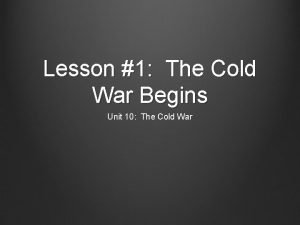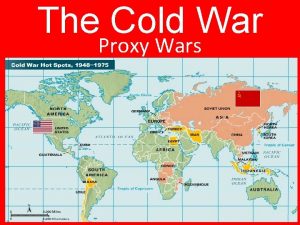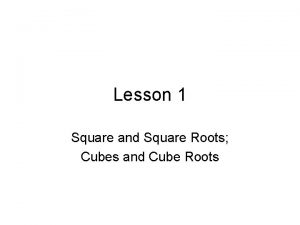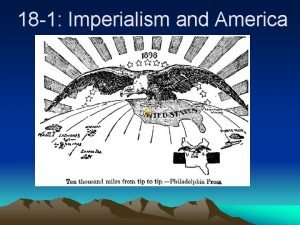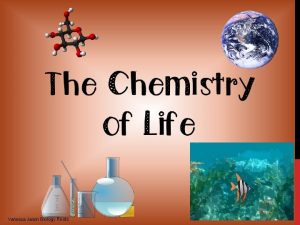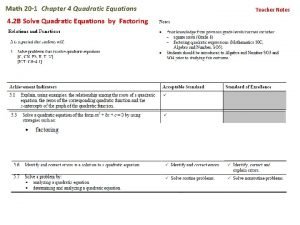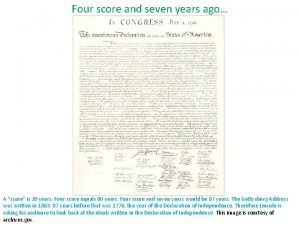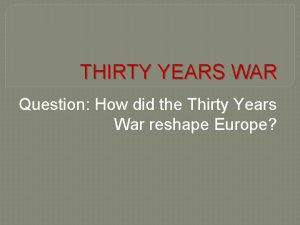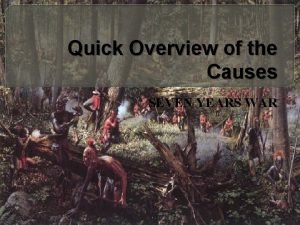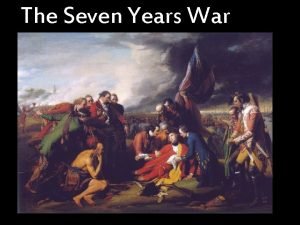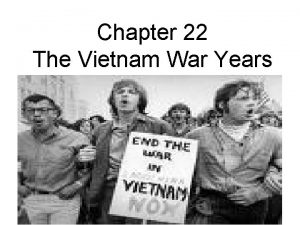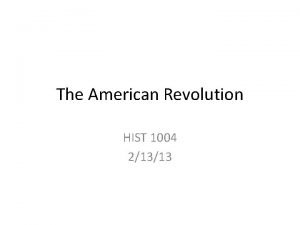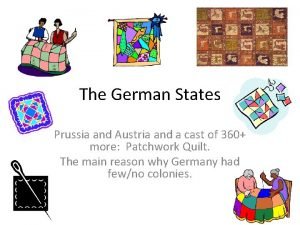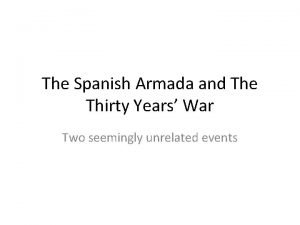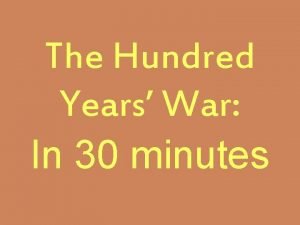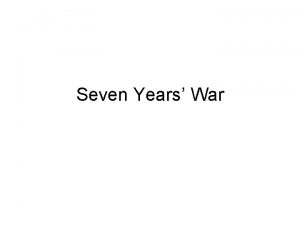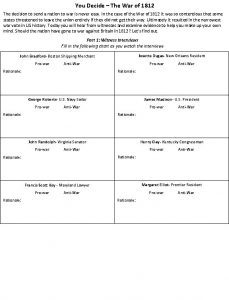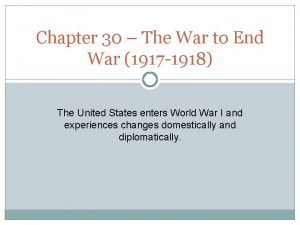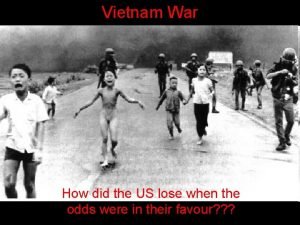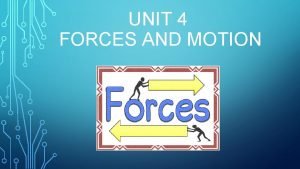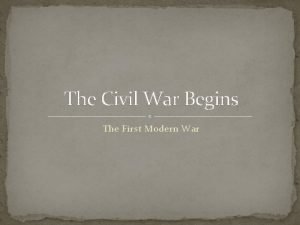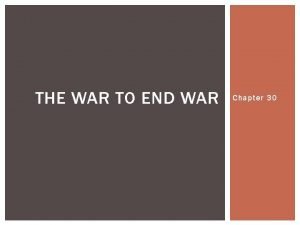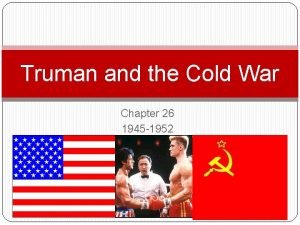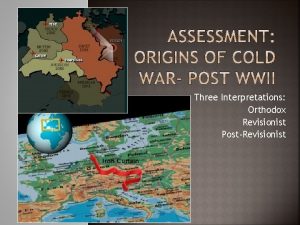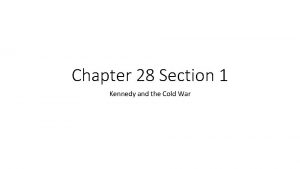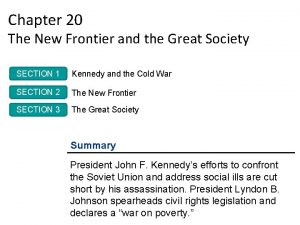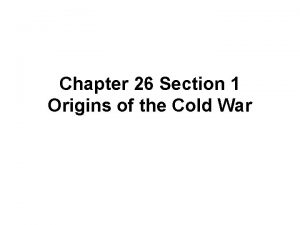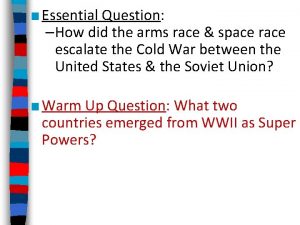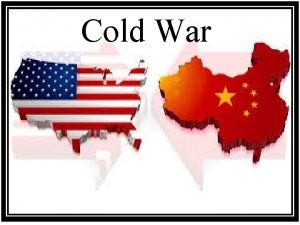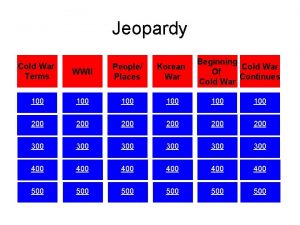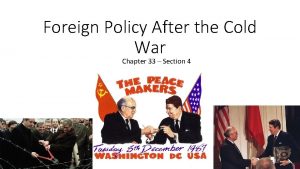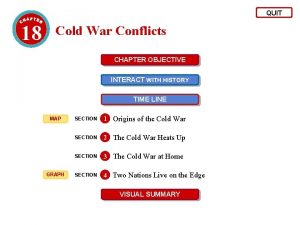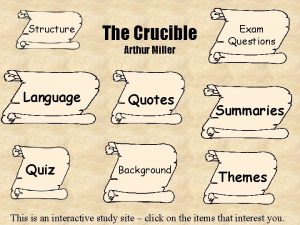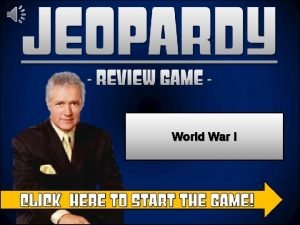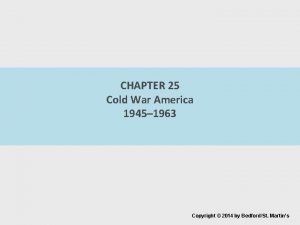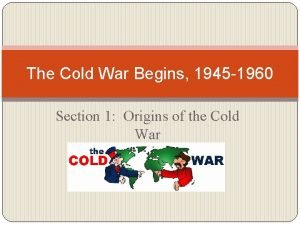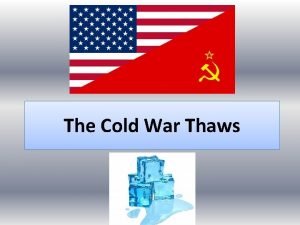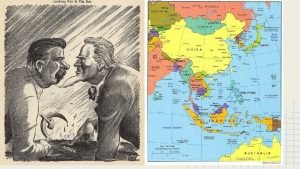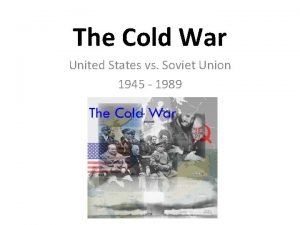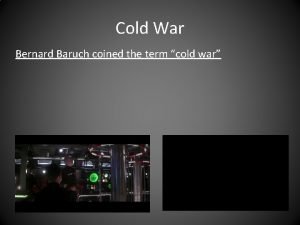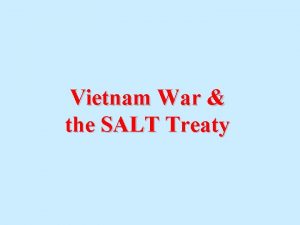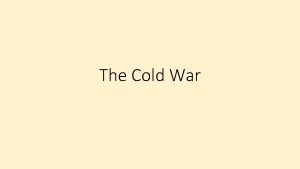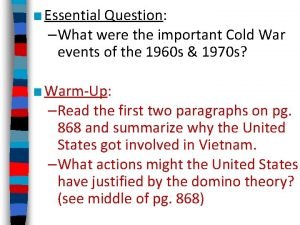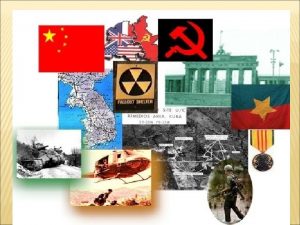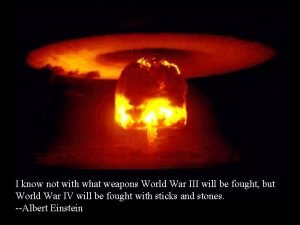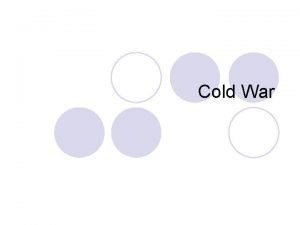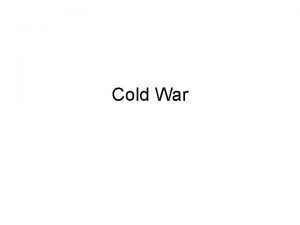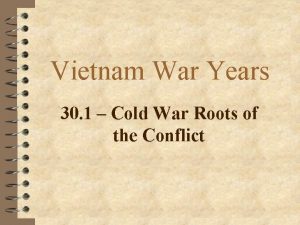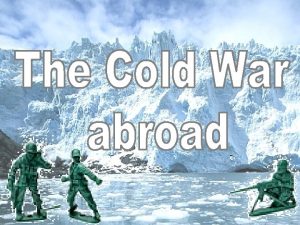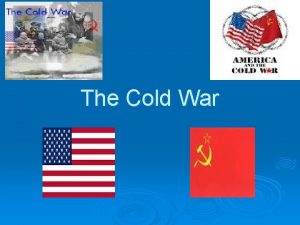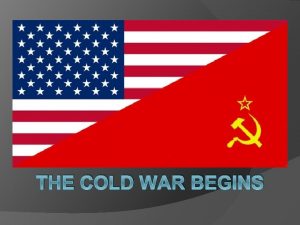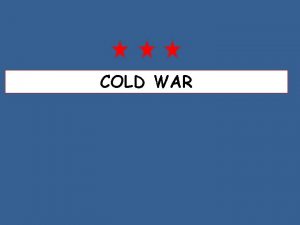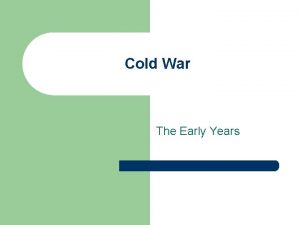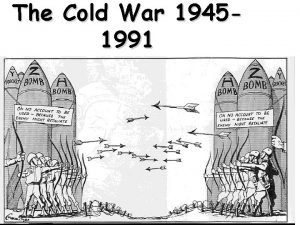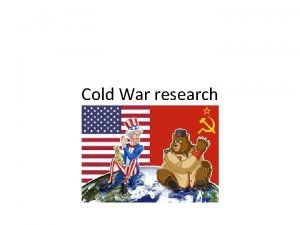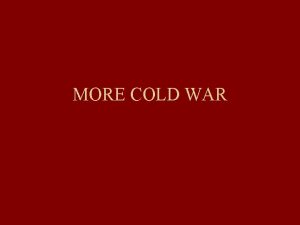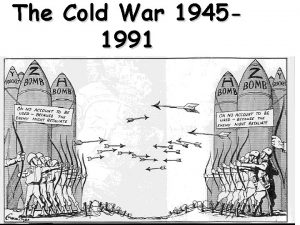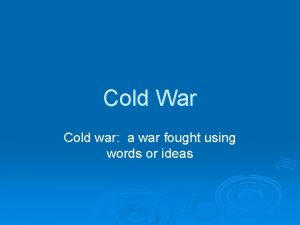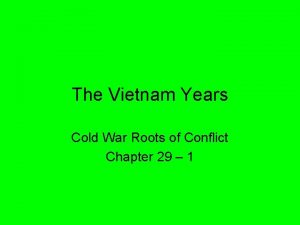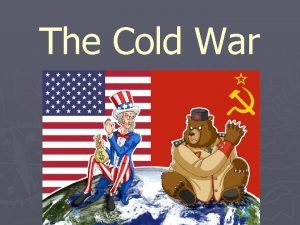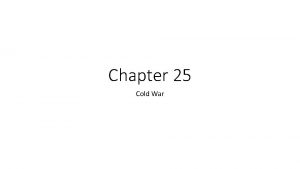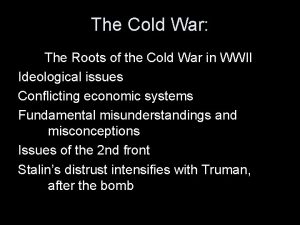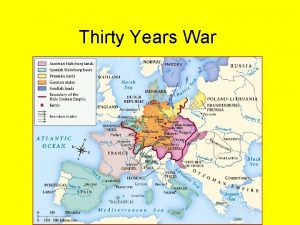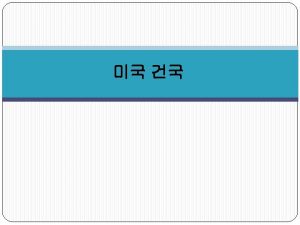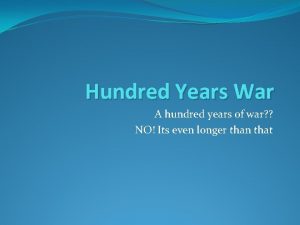The Cold War Years Roots of the Cold





























































- Slides: 61

The Cold War Years

Roots of the Cold War • Philosophical Differences: Communism vs capitalism republic • WWII Conflicts: Soviets wanted British and Americans to open a 2 nd front earlier and US develops the A-bomb. • Postwar Conflicts: USSR refused to live up to wartime promises of elections in Eastern Europe and the US made efforts to resist Soviet expansion

The Iron Curtain Descends • US and British pressed Stalin to hold free elections in Soviet occupied lands. • Stalin had no intention of giving political and economic control over Eastern Europe. • Protect his country by creating a line of Soviet -friendly nations.


Communism Spreads • Stalin used whatever means necessary to achieve his goals. • Every nation in Eastern Europe had a Sovietfriendly Communist government. • Soviet treatment of Germans living in Poland other countries: – Removed “orderly and humane manner. ” – Soviets relocated them with great brutality. – Several hundred thousand died, millions forced to relocate to West Germany.

United States Responds • Postwar world, the United States became the leader of all nations committed to democratic ideals and freedoms. • Containment: George Kennan, stop the spread of communism not just by military force but also economic aid to strengthen other countries.



The Marshall Plan • Purpose: A U. S. financial aid program to rebuild the economies of European countries in order to create stable conditions for democratic governments. • Total amount of aid: $13. 4 Billion • Number of countries that received aid: 16 • Countries that received the most aid: Great Britain, France, and Italy.

Crisis in Berlin • Berlin divided into four sections. • A democratic West and a communist East.

Crisis in Berlin

Berlin Airlift • Everyday 7, 000 tons of supplies were flown into West Berlin. • Soviets lifted the blockade.

NATO • Belgium, France, Luxembourg, Netherlands, and the UK joined together in a system of common defense in 1948. • April 1949, US and 6 other nations joined the original creating a new military alliance – the North Atlantic Treaty Organization. • An armed attack against one of the member nations would be considered an attack against all.

Think Pair Share • Why did the United States fear that economic problems would make European nations more vulnerable to communism? • How was the Marshall Plan supposed to help contain the spread of communism? • How much money did the US give through the Marshall Plan? • How much more do you think would have been given had the Soviet Union accepted the US offer?

Life in America after WWII • The GI Bill: provided money for college or job training, arranged for loans for homes, help finding work, years worth of unemployment. • Increasing demand: returning veterans, baby boomers, need for new consumer goods • Racial Minorities: Executive Order 9981, ended segregation un the U. S. armed forces.

Human Rights • United Nations and Eleanor Roosevelt • Universal Declaration of Human Rights: • All humans are born equal and free • End slavery, torture, inhumane punishment • Civil Rights • Elementary education free and available to all 16

Trying to Build a Better World • Programs for a Safer World: – World Bank: help poor countries build their economies – International Monetary Fund: promoting financial relationships between countries – United Nations: save succeeding generations from the scourge of war, reaffirm faith in fundamental human rights – General Agreement on Tariffs and Trade: rules and regulations on international trade

Building a Better World • The United States never joined the League of Nations and needed Senate approval to join the United Nations. • In partners, write a speech that a member of Congress might have given to the voters back home explaining what the United Nations is, why it was founded, and how it intends to accomplish its goals. • You are trying to convince people that joining the UN is a positive thing.

China Becomes Communist • Chiang Kai-Shek (Nationalist) • Inefficient and corrupt • US sent $3 billion in aid Mao Zedong (Communist) • Appealed to the peasant in the country • Won support of people, took over China 1949. • American public outraged that containment failed. • Fear of communism in American began to intensify out of control.

Korean before the War • Close to China, Japan and Russia. • Yalta Conference division to North and South sectors. • 38 th parallel • North Korea Communism • South Korea Democratic

Start of Korean War • June 25, 1950: North Korea invades South Korea. • Soviet sponsored, US not ready to fight. • Truman thought the US had to take a stand against communist aggression. • United Nations police action

Key Battles of the Korean War • North Korea outnumbered and outgunned South Korea’s defenders. • End of July, NK had pushed UN forces all the way to the southeastern tip of South Korea. • This final line needed to be held at all costs.

Inchon Landing • UN forces held port of Pusan. • Communist attack had stalled. • Thousands of troops and tons of equipment were arriving daily. • Mac. Arthur ready to take the offensive. • Land behind NK lines at Inchon, very risky. • “We shall land at Inchon and I shall crush them. ”

North Korea on the run • UN forces quickly moved out to recapture Seoul. • North Koreans had stretched themselves too thin and were powerless to stop the forces. • Huge numbers of North Korean troops were destroyed or forced to surrender. • By October, all of South Korea was back in UN hands. • Stop at the 38 th parallel of take all of North Korea?

UN forces retreat • 260, 000 Chinese troops came to NK rescue. • Size of the Chinese forces was simply too large to recover from. • UN forces fell all the way back to Seoul (longest fallback in U. S. Military history) • Winter arrived


Mac. Arthur is Fired • The UN faced a choice between defeat by the Chinese or a major war with them. • Called for expanding the war by bombing the Chinese mainland, use of atomic weapons. • Lieutenant General Matthew Ridgeway stopped the Chinese onslaught and went on offensive. • Truman believed peace was possible without losing South Korea, Mac. Arthur disagreed.

Mac. Arthur Fired • Wanted to see communism defeated in Asia even if the only was to expand the war. • Increasingly made public statements that challenged the authority of the president. • Made threats against the Chinese government • Truman had no choice but to fire him. • Public reaction?

Fighting Ends in Korea • July 1951, peace talks began on both sides, sick of the fighting and death.

Unsuccessful Negotiations for Peace • Boundary of North and South Korea?

Truman’s Statement about Korea • “For ourselves, we seek no territory or domination over others…We are concerned with advancing our prosperity and our wellbeing as a Nation, but we know that our future is inseparably joined with the future of other free peoples. ” • Do you agree or disagree? • Is our future inseparably joined with the future of other free peoples?

Eisenhower: Foreign Policy • Brinkmanship: diplomatic art of going to the brink of war without actually getting into war. • Massive retaliation: pledge the US would use overwhelming force against the Soviet Union to settle serious conflict. • CIA: Central Intelligence Agency

Soviet Union and Warsaw • Stalin died, Khrushchev is his successor • Warsaw Pact: Eastern European nations would defend each other and the USSR at all costs. • 1955 Summit: meeting of the heads of government, Eisenhower “open skies”

Cold War “Hot Spots” • Vietnam and the seeds of war • 1954 France lost control of their colony of Vietnam. • Communist ruled the North temporarily until elections could transpire. • Eisenhower: unacceptable because the communists could win. • South Vietnam

Atomic Anxiety • American in the 1950 s had not faced a serious threat of war. • Atomic bomb changed that for many Americans • Backyard bomb shelters

Growing Fear of Communism • 1949 two events increased Americans anxiety: – Soviets possessed an atomic weapon – Communist had gained control of China • Mao Zedong leader of communist China

The Hydrogen Bomb • Fusing together hydrogen atoms. • Island they set if off simply vanished. • Fireball: 3 miles diameter. • Cloud was more than 25 miles tall.

Arms Race • Worried that the other would gain an advantage, the USSR and the US began to build stockpiles of weapons. • Arms race: international contest between counties seeking a military advantage. • New Bombs (intercontinental ballistic missiles) • Soviet Advances: Sputnik • US: NASA

Arms Race Counterpoints • John Foster Dulles, Sec of State – “The principal deterrent to aggressive war is mobile retaliatory power. The retaliatory power must be vast in terms of its potential… The essential is that a wouldbe aggressor should realize that he cannot make armed aggression. ” • Albert Einstein, Scientists – “ There lies before us, if we choose, continual progress in happiness, knowledge, and wisdom. Shall we, instead, choose death, because we cannot forget our quarrels? ”

American’s React to Threat of Nuclear War • Nuclear attack and fallout • Federal Civil Defense Administration to help educate and prepare the public for nuclear emergencies. • Duck and Cover • Sirens installed in communities across nation • Preparedness also raised fears. • https: //www. youtube. com/watch? v=IKq. Xu 5 jw 60

Fighting the Spread of Communism in the US • People were afraid of possible communist influence in the US government. • House of Un-American Activities Committee: purpose was to investigate the full range of radical groups in the US. • Communist influence in the American Film industry. • Hollywood Ten

• Truman and Loyalty • The Smith Act: made it a crime to call for the overthrow of the US government or belong to an organization that did so. • Mc. Carran Act: required communist organizations to register with the government and prevented communist from entering the US. • https: //www. youtube. com/watch? v=g_Da. MKUP 3 Og • https: //www. youtube. com/watch? v=Sk. Yl_AH-qyk

Spy Cases • Alger Hiss, 1948 - State department official, mircofilm of US documents. • Ethel and Julius Rosenberg, 1951 – first US citizens executed for espionage. • https: //www. youtube. com/watch? v= M 1 Rdh. WH 2 a. NE

Senator Joseph Mc. Carthy • Falsely clamming there were communist in the US government. • Mc. Carthyism: tactic of spreading fear and making baseless charges. • Started accusing very high ranking officials even the entire US Army, the public began to view his tactics as unfair and unbelievable.

• The school district has decided that any student who questions school policy is a dangerous influence. School leaders have decided to give detentions to all students suspected of disagreeing with school policy. • Write a half page response to this.

Television Age • I Love Lucy! • Lucille Ball • New production techniques, filmed rather than broadcast live. • https: //www. youtube. com/watch? v=Hnb. Nc. Ql z. V-4

TV Changes American Life • Scientists had been working on TV technology since the 1920 s, finally ready for home use after WWII. • Between 1945 -1950, 5 million sets sold, 1959 40 million.

TV • Politics • Advertising: TV’s combination of picture and sound gave it more persuasive potential than radio. • Programming: introduction of categories we still see today. • Concerns: violent content on young viewers • Still a concern even today?

Transistors and Computers • 1940 s, researchers began building computers. • First computers took up entire rooms and drew large amounts of electricity. • UNIVAC: universal automatic computer (1951) • Weigh 30, 000 lbs, cost $50, 000

Salk Vaccine • Worst year on record for polio in the United States was 1952, more than 57, 000 people came down with the disease. • Jonas Salk developed the polio vaccine that same year. • 1955 Children began receiving the shot.

Cultural Change in the 1950 s • 1950 s US was the world’s greatest economic power. • American people were 6% of world’s population, yet produced 1/3 of world’s goods and services. • Baby boom – Levitt communities – Consumer goods – Automobiles Buying meant busy factories, high company profits, and plentiful jobs.

Life in 1950 s • New communities: suburban developments – Affordability – Sunbelt – Mass-production of homes • New Highways: Interstate Highway System – 40, 000 -miles – Main means of transportation across the US • Art of Rebellion – Against sameness and conformity – Building reputations as rebels who defined social norms, American was fascinated with this image.

Discussion • TV Violence in today’s society. • Baby Boomer generation reaching retirement age, what that means for America. • The idea of non-conformity in a society built to conform.

The New Frontier and Great Society In groups answer the following: How does change effect your daily life? Think about: New policies New buildings Places closing Community/School/Government programs

1960 s America • American were ready for a change • United States adopted many new policies and programs • It was a time of the space race, social change, and a time when the Supreme Court became actively involved in Civil Rights • 1960 Presidential election Vice President Richard Nixon vs. Massachusetts Senator John F. Kennedy

Kennedy Era • 1 Election of 1960 – Televised debates & Civil Rights • 2 The Camelot Years – Kennedy Mystique, Best and the brightest • 3 New Military Policy – Flexible Response • 4 Crises over Cuba – Fidel Castro, Bay of Pigs, Cuban Missile Crisis • 5 Crisis over Berlin – Berlin Wall, Easing tensions • 6 Promise of Progress – New Frontier, Peace Corps, Race to the Moon • 7 Tragedy in Dallas – Assassination and Warren commission

John F. Kennedy • A young, vigorous idealists who filled his advisors with the best and the brightest. • https: //www. youtube. com/watch? v=4 ph. B-r. Rj. YQw • Bay of Pigs Invasion – Fidel Castro • Berlin Wall • Cuban Missile Crisis – closest the world has ever come to nuclear war

• Nuclear powers must avert those confrontations which bring an adversary to a choice of either a humiliating retreat or a nuclear war. To adopt that kind of course in the nuclear age would be evident only of the bankruptcy of our policy – or of a collective death wish for the world.

Kennedy’s New Frontier Image and reality New Frontier Space program Warren Court – controversial Court rulings greatly extended individual rights and freedoms • Kennedy Assassinated • •

Lyndon B. Johnson • A seasoned senator and astute politician. • Great Society – Domestic programs of his administration • War on Poverty • Education • Medicaid and Medicare • Decline of the Great Society – Vietnam

Provisions for a Great Society Program • In partners you will be outlining provisions for a Great Society-inspired program that would address a problem today. • First discuss some of the major problems that society faces today. (Use the categories and bills listed on p. 690 to spark some ideas. ) • Select a problem you would like to address, then write an outline describing the problem and a proposed solution. • Be sure to include details of roles of individuals and groups involved in the solution.
 The cold war lesson 1
The cold war lesson 1 Cold war sides
Cold war sides What's a perfect square
What's a perfect square Existence and uniqueness of square roots and cube roots
Existence and uniqueness of square roots and cube roots The roots of american imperialism economic roots
The roots of american imperialism economic roots Chonp
Chonp X 1 2 formula
X 1 2 formula What is the perfect square of 300
What is the perfect square of 300 Sheep years to human years
Sheep years to human years 300 solar years to lunar years
300 solar years to lunar years Where is this image
Where is this image 30 years war phases
30 years war phases Héroïne dans la guerre de 100 ans (100 years war).
Héroïne dans la guerre de 100 ans (100 years war). Thirty years' war causes
Thirty years' war causes Causes of the seven years war
Causes of the seven years war Pontiac's rebellion apush
Pontiac's rebellion apush What caused the seven years war
What caused the seven years war The vietnam war years chapter 22
The vietnam war years chapter 22 Seven years war
Seven years war 30 years war causes
30 years war causes Hapsburgs
Hapsburgs Consequences of the 100 years war
Consequences of the 100 years war What caused the seven years war
What caused the seven years war Was josette dugas pro war
Was josette dugas pro war Chapter 30 the war to end war
Chapter 30 the war to end war War at home and abroad madison
War at home and abroad madison Ich war du warst er sie es war
Ich war du warst er sie es war War warst war
War warst war Vietnam war
Vietnam war Tug of war or tug-of-war
Tug of war or tug-of-war Toward civil war lesson 3 secession and war
Toward civil war lesson 3 secession and war Presidential and congressional reconstruction venn diagram
Presidential and congressional reconstruction venn diagram Why was the civil war the first modern war
Why was the civil war the first modern war Chapter 30 the war to end war
Chapter 30 the war to end war Characteristics of cold war
Characteristics of cold war Cold war
Cold war Section quiz chapter28 kennedy and the cold war
Section quiz chapter28 kennedy and the cold war Chapter 20 section 1 kennedy and the cold war
Chapter 20 section 1 kennedy and the cold war Chapter 26 section 1 origins of the cold war
Chapter 26 section 1 origins of the cold war Why did the arms race escalate during the cold war
Why did the arms race escalate during the cold war Communist and capitalist countries cold war
Communist and capitalist countries cold war Us board
Us board Free verse
Free verse Chapter 33 section 4 foreign policy after the cold war
Chapter 33 section 4 foreign policy after the cold war Cold war tension graph
Cold war tension graph Main themes of the crucible
Main themes of the crucible 2 sides of cold war
2 sides of cold war Wwi jeopardy
Wwi jeopardy Chapter 25 cold war america
Chapter 25 cold war america The cold war begins 1945-1960
The cold war begins 1945-1960 Cold war acrostic
Cold war acrostic The cold war vocab
The cold war vocab Who fought in the cold war
Who fought in the cold war Domino theory
Domino theory What does salt stand for cold war
What does salt stand for cold war Was the cold war capitalism vs communism
Was the cold war capitalism vs communism Chapter 17 section 1 two superpowers face off answer key
Chapter 17 section 1 two superpowers face off answer key 1991 - 1947
1991 - 1947 Cold war knowledge organiser
Cold war knowledge organiser Brinkmanship cold war
Brinkmanship cold war Communism cold war
Communism cold war Weapons of the cold war diagram
Weapons of the cold war diagram
